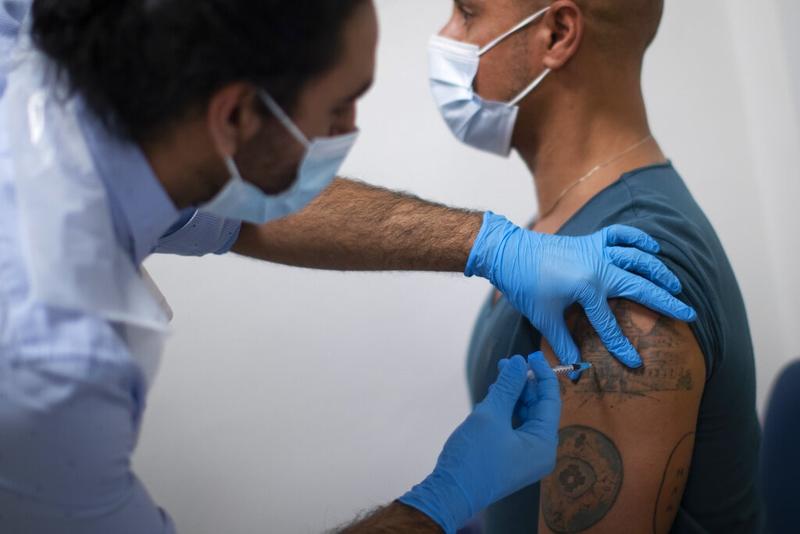 A man receives the first of two doses of the Pfizer-BioNtech COVID-19 vaccine at a clinic in London, Britain, Dec 14, 2020. (AARON CHOWN / POOL PHOTO VIA AP)
A man receives the first of two doses of the Pfizer-BioNtech COVID-19 vaccine at a clinic in London, Britain, Dec 14, 2020. (AARON CHOWN / POOL PHOTO VIA AP)
BERLIN/GENEVA - BioNTech Chief Executive Ugur Sahin said on Monday he was confident a COVID-19 vaccine co-developed by his company would be effective against a variant of the coronavirus that has emerged in Britain.
He said on Bild TV that the German company would investigate the mutation in the coming days but that he viewed the matter with “with a degree of soberness”.
Countries across the globe shut their borders to Britain on Monday due to fears about a highly infectious new coronavirus strain, causing travel chaos and raising the prospect of food shortages in the United Kingdom.
None of the virus mutations, including the latest UK variant, has made a significant impact on the susceptibility of the virus to any of the currently used therapeutics, drugs or the vaccines under development, WHO experts said
Sahin was speaking shortly after the European Union cleared regulatory hurdles for the vaccine, co-developed with Pfizer, to be rolled out after Christmas.
READ MORE: Pfizer, BioNTech vaccine wins European backing
The note of calm from the CEO about the UK mutation echoed the World Health Organization (WHO), which cautioned against major alarm, saying this was a normal part of a pandemic’s evolution.
'No significant impact' on vaccines
None of the virus mutations, including the latest UK variant, has made a significant impact on the susceptibility of the virus to any of the currently used therapeutics, drugs or the vaccines under development, WHO experts said.
According to Soumya Swaminathan, the WHO's chief scientist, the coronavirus has mutated at a much slower rate than the influenza virus, with the latter having required that its vaccine strains be reviewed and revised each year based on the circulating strains prevalent that year.
ALSO READ: COVID-19: S. Africa identifies new strain causing surge in cases
Swaminathan emphasized that it was important to continuously monitor what's happening to this virus, with the focus on bringing transmission down and getting it as low as possible.
"Because the more viruses you have in circulation, the more chances of mutation and the more such variants that can arise. The bottom line here is to keep the virus transmission low and keep circulation low. Don't allow it to get out of hand and spread in the population. That way, we can keep the mutations down."
According to Mike Ryan, executive director of the WHO's Health Emergencies Program, even with the latest UK variant, "there's zero evidence at this point that there's any increase in severity associated with this disease"
Meanwhile, according to Mike Ryan, executive director of the WHO's Health Emergencies Program, even with the latest UK variant, "there's zero evidence at this point that there's any increase in severity associated with this disease".
He reiterated that no variants have yet established themselves as "having any higher level of severity, or invading our diagnostics, or hiding from vaccines, or the effectiveness of vaccines".
Britain reported to WHO on Dec 14 of a new virus variant that has been associated with an increase in R0, which is the number of people that one infected individual transmits the virus to, from 1.1 to 1.5.
Ryan said that R0 around 1.5 means the virus can be stopped.
READ MORE: UK's Hancock says new COVID-19 mutation 'out of control’


